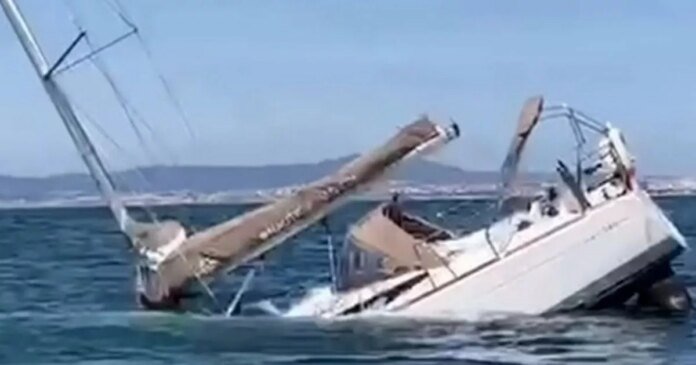A dramatic incident unfolded when a boat was deliberately targeted and sunk by a group of orcas. The event, occurring on September 13, led to the yacht’s occupants requiring rescue as their vessel went under.
Video footage circulating online captures the sailboat, belonging to the Nautic Squad Club, being repeatedly struck by orcas. Eyewitnesses observed one orca relentlessly hitting the hull, causing the yacht to sway precariously before ultimately succumbing to the water.
Five individuals were on board the yacht in Portugal during the sinking. Fortunately, all were safely rescued by nearby tourist boats and lifeguards from the Lisbon Maritime Search and Rescue Coordination Centre.
The same pod of orcas was reportedly involved in another incident off Cascais, further north, where a second yacht was targeted. While the second vessel did not sink, it suffered damage, and its passengers were also rescued.
Portuguese coastal authorities were alerted around 12:30 pm and promptly dispatched rescue teams upon receiving the distress call.
Observers and experts are hesitant to label the orcas’ actions as aggressive, suggesting that the ramming incidents may stem from curiosity or playful behavior rather than malice.
Despite being known as ‘killer whales,’ wild orcas have not caused any recorded human fatalities. However, there have been four deadly incidents involving captive orcas since the 1990s, with the orca Tilikum from Sea World being implicated in three of them.
The moniker ‘killer whale’ was bestowed by ancient sailors who witnessed these creatures hunting larger whales. While they are not prone to harm humans, they can inflict damage on vessels.
The first recorded interaction between orcas and boats was in May 2020, with over 750 subsequent encounters where orcas have nudged or collided with boats.
Experts suggest that orcas typically engage in boat interactions out of playfulness, boredom, or as a learned behavior within a specific subgroup. Individual orcas, like White Gladis, may initiate such behaviors following a traumatic event, such as a collision with a boat or nets.
While the orcas’ behavior may seem aggressive to humans, it is not considered an act of aggression towards humans. Other theories propose that the behavior could stem from territoriality or frustration due to boat noise disrupting their communication.
The incident has raised concerns among local sailors and boating associations, prompting calls for clearer guidelines, warning systems, and protective measures for yacht owners in areas known for orca activity.
Marine biologists are closely monitoring these interactions to gain insights into the behavior and mitigate future incidents.

